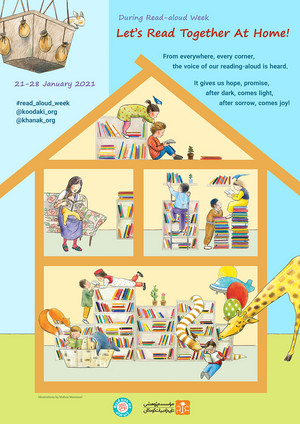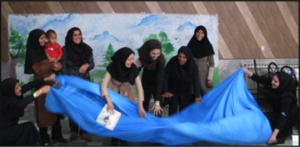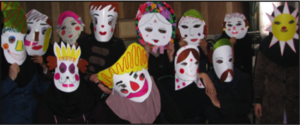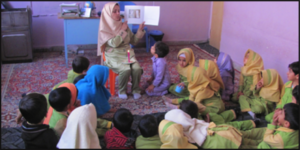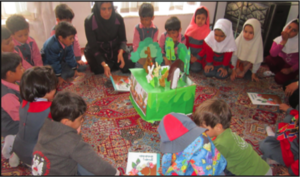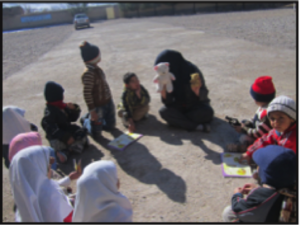Iran - Read with Me
Read-aloud Week 21-28 January 2021
More information
“Read with Me” is a project designed and implemented by the Institute for Research on the History of Children’s Literature in Iran (IRHCLI), to promote reading for/with disadvantaged children who are generally at risk. “Read with Me” started as a pilot project in 2010. It was implemented in a marginal area of South-East Tehran close to brick kilns where some 120 Afghan families lived. Since, the project has been successfully expanded to many rural and urban areas in Iran.
Reading literature with the aim of intellectual and emotional development of children is not an integral part of the Iranian educational system, especially in deprived communities where children live in poverty and have to work. There are thousands of children working on the streets of big cities in Iran: digging into garbage bins for recyclables or selling chewing gum or flowers at intersections. Most of them are members of undocumented Afghan families who live in Iran illegally and are barred from attending school. Some are Iranians whose parents have left their rural homes to try and earn a living in the big city.
Since 2012, IBBY Iran, with IBBY/Sharjah funding, has worked with the IRHCLI, to promote reading for/with disadvantaged children in Iran. The project has been extended to 13 provinces in Iran: including 15 city centres, 6 marginal areas and 75 remote villages. More than 90 “Read with Me” small libraries have been set up and are active. 120 training workshops have been conducted for teachers, preschool tutors, librarians and or volunteers. More than 500 teachers, preschool tutors or volunteers have been trained.
"Read with Me" Project - Southern Khorasan, Iran
The IBBY/Sharjah Fund supported the “Read with Me” project in two districts of Southern Khorasan in Iran. The project “Read with Me” aimed to facilitate access to suitable and quality books for street/working children and/or children living in remote areas.
The project selected 26 rural Kindergartens. Selected books were purchased and packed in “book bags” to be sent to Kindergartens to provide three months of reading, then the bags are exchanged between the kindergartens in the region. The project also provided training for teachers, tutors and librarians in storytelling and other activities (drama, art). Supervisors visited the preschools to assist the teachers with storytelling and book reading sessions were held in the preschools at least twice a week.
Three months later, in January 2014, a second book package was assembled and sent to the preschools. At this stage, there were enough books for the teachers to set up a small library in the preschool and the children could begin to borrow books to read at home. In May 2014 a third set of book packages was sent to locations for a summer activities programme. The preschools in the villages opened their libraries for the summer and the reading and other activities attracted children of all ages and from surrounding villages.
The programme was very well received and the results well documented. The project reached 750 children and involved training 30 preschool teachers. Overall 8250 quality books were distributed and 21 small libraries were established in the two regions. Equally important are the qualitative results as reported by the teachers.
• The children who were reluctant to reading books, have become book lovers by enjoy reading and the related activities. They are now looking forward to having reading book sessions every day.
• Their concentration is considerably improved. They can sit and listen to stories from the beginning to the end.
• They like to relate the stories after the teacher reads the book. They can remember the most important points of the story and can describe them very well. They can follow the sequence of events and relate them correctly.
• They have learned many difficult and rare words through the books and can pronounce the words much better than before.
• They love to borrow the books and take them to home and relate the stories for their family members. Younger siblings (about 2-3 year old) are therefore becoming interested in books and reading.
Libraries for Children of Religious and Ethnic Minorities
In 2016 the Sharjah/IBBY Fund approved the financing of a project to set up and maintain libraries in deprived sectors of ethnic and religious minorities, targeting poor and deprived Iranian children in the Sistan and Balouchestan provinces. The objective is to furnish children of minority religions and ethic groups living in remote and poor regions of Iran with appropriate and high quality books. It is expected to reach 540 children and youth (aged 7 to 16) in schools in four villages, as well as 20 to 25 adults through training workshops.
The project would include selecting and purchasing sufficient books, workshops on different genres of books, cataloguing them and establishing the libraries. A further workshop would offer training in reading promotion through storytelling, creative theatre and games. The project is led by the Bamdad Group, which is part of the House of Librarians for the Promotion of Reading Among Children and Young People that focuses on reading promotion for needy and remotely located children.
Read with Me - Update 2016
Read with Me began in April 2019 a series of reading projects to meet the needs of children in areas of Iran affected by floods: Lorestan Province (KhorramAbad, Doroud, Poldokhtar) and Khuzestan Province (Gourieh): the project is summarised in the report, Read with Me in Flooded Regions. In 2020, in response to the closing of schools and kindergartens due to the coronavirus pandemic, Read with Me has set up a Read with Me at Home activities.


